【范文】五年级上册英语重要辅导资料(4-6单元)人教版
新人教版PEP五年级英语上册各单元知识点总结(完美版)
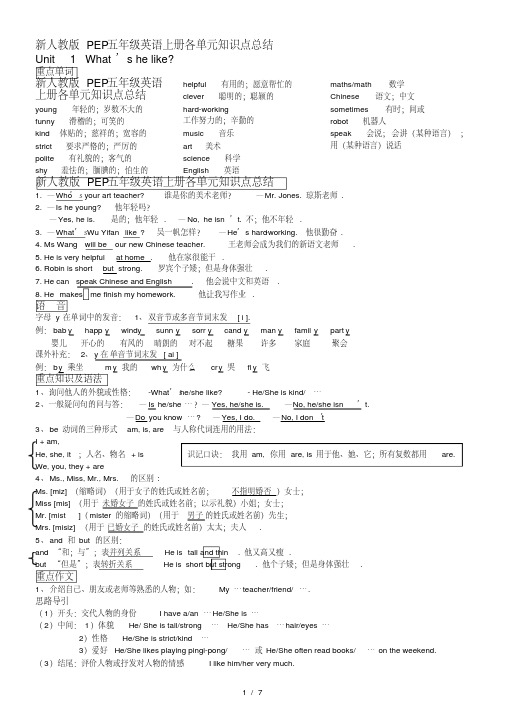
新人教版PEP五年级英语上册各单元知识点总结Unit 1 What’s he like?重点单词新人教版PEP五年级英语上册各单元知识点总结young 年轻的;岁数不大的funny 滑稽的;可笑的kind 体贴的;慈祥的;宽容的strict 要求严格的;严厉的polite 有礼貌的;客气的shy 羞怯的;腼腆的;怕生的helpful 有用的;愿意帮忙的clever 聪明的;聪颖的hard-working工作努力的;辛勤的music 音乐art 美术science 科学English 英语maths/math 数学Chinese 语文;中文sometimes 有时;间或robot 机器人speak 会说;会讲(某种语言);用(某种语言)说话新人教版PEP五年级英语上册各单元知识点总结1. —Who’s your art teacher? 谁是你的美术老师?—Mr. Jones.琼斯老师.2. —Is he young? 他年轻吗?—Yes, he is. 是的;他年轻. —No, he isn’t.不;他不年轻.3. —What’s Wu Yifan like? 吴一帆怎样?—He’s hard-working. 他很勤奋.4. Ms Wang will be our new Chinese teacher. 王老师会成为我们的新语文老师.5. He is very helpful at home. 他在家很能干.6. Robin is short but strong. 罗宾个子矮;但是身体强壮.7. He can speak Chinese and English. 他会说中文和英语.8. He makes me finish my homework. 他让我写作业.语音字母y在单词中的发音:1、双音节或多音节词末发[ i ].例:bab y happ y windy sunn y sorr y cand y man y famil y part y婴儿开心的有风的晴朗的对不起糖果许多家庭聚会课外补充:2、y在单音节词末发[ ai ]例:by 乘坐m y 我的wh y 为什么cry 哭fl y 飞重点知识及语法1、询问他人的外貌或性格:-What’s he/she like? - He/She is kind/…2、一般疑问句的问与答:—Is he/she…?—Yes, he/she is.—No, he/she isn’t.—Do you know…? —Yes, I do.—No, I don’t3、be动词的三种形式am, is, are与人称代词连用的用法:I + am,He, she, it;人名、物名+ isWe, you, they + are4、Ms., Miss, Mr., Mrs.的区别:Ms. [miz](缩略词)(用于女子的姓氏或姓名前;不指明婚否)女士;Miss [mis](用于未婚女子的姓氏或姓名前;以示礼貌)小姐;女士;Mr. [mist](mister的缩略词)(用于男子的姓氏或姓名前)先生;Mrs. [misiz](用于已婚女子的姓氏或姓名前)太太;夫人.5、and和but的区别:and “和;与”;表并列关系He is tall and thin. 他又高又瘦.but “但是”;表转折关系He is short but strong. 他个子矮;但是身体强壮.重点作文1、介绍自己、朋友或老师等熟悉的人物;如:My …teacher/friend/….思路导引(1)开头:交代人物的身份I have a/an…He/She is…(2)中间:1)体貌He/ She is tall/strong…He/She has …hair/eyes…2)性格He/She is strict/kind…3)爱好He/She likes playing pingi-pong/…或He/She often read books/… on the weekend. (3)结尾:评价人物或抒发对人物的情感I like him/her very much.识记口诀:我用am, 你用are, is用于他、她、它;所有复数都用are.2、范文:(1)课本P9 Read and write(2)My Chinese teacherI have a new Chinese teacher. She is Ms. Chen. She is tall and thin. She has big eyes and long black hair. She is kind and funny. Sometimes she is strict, too. She is hard-working. She likes reading. Her class is so much fun. We all like her.Unit 2My week重点单词新人教版PEP五年级英语上册各单元知识点总结Monday (Mon.) 周一Tuesday (Tue./Tues.) 周二Wednesday (Wed./Weds.) 周三Thursday (Thur./Thurs.) 周四Friday (Fri.) 周五Saturday (Sat.) 周六weekend 周末(周六、日)wash my clothes 洗衣服watch TV 看电视do homework 做作业read books 看书play football 踢足球on the weekend 在周末play sports/do sports 做体育运动listen to music 听音乐play ping-pong 打乒乓球新人教版PEP五年级英语上册各单元知识点总结1. —What do you have on Thursday s? 星期四你们上什么课?—I have math, English and music. 我们上数学、英语和音乐课.2. —What do you do on Thursdays, Grandpa? 爷爷;星期四你要做什么?—I have a cooking class with your grandma. 我和你奶奶去上烹饪课.3. —Do you often read books in this park? 你经常在这个公园看书吗?—Yes, I do.是的—No, I don’t.不是4. Look at my picture. 看我的图片.5. You look tired. 你看起来很累.6. You should play sports every day. 你应该每天做运动.语音字母组合ee, ea在单词中的的发音:[ i: ]例:fee t bee f m eet see fee d tea rea d ea t rep ea t脚牛肉遇见看见喂养茶阅读吃重复注:1、ee组合绝大部分发长音[ i: ];只有少部分发短音[ i ];如:coffee 咖啡2、ea字母组合除了发[ i: ];还有可能发[ e ]等发音;如:bread 面包;或者发[ ei ];如:great 好极了重点知识及语法1、询问做什么事/活动:—What do you do …? —I often play ping-pong…询问星期几上什么课:—What do you have on…? —We have English class…2、一般疑问句的问与答:—Do you often read books? —Yes, I do. —No, I don’t.3、on+具体某一天(年月日;星期);如:on Monday/Tuesday…课外at+具体时刻(…点钟);如:at 12 o’clock 在十二点整补充:in+大致时间(年月;早中晚);如:in 2014 在2014年in the morning/afternoon/evening4、play + 球类、棋类、娱乐活动;如:play football/ping-pong补充:play + the + 乐器(第四单元知识);如:play the pipa/piano/violin…重点作文1、描写一周的生活;如:My week思路导引(1)开头:简单的自我介绍:My name’s…/ I’m…(2)中间:1)介绍周一至周五的情况;可以着重介绍自己最喜欢的那一天:I go to school from Monday to Friday. I like…because I have…2)介绍自己周六、日的活动:I often watch TV/…on the weekend.(3)结尾:This is my week. What about yours?2、范文:My weekMy name is Li Ming. I go to school from Monday to Friday. I like Tuesdays and Thursdays, because I havemusic and PE. I often do my homework and read books on Saturdays. I often play ping-pong on Sundays.Unit 3What would you like? 重点单词新人教版PEP五年级英语上册各单元知识点总结hamburger 汉堡包tea 茶sandwich 三文治salad 沙拉fresh 新鲜的;刚摘的healthy 健康的delicious 美味的;可口的hot 辣的;辛辣的sweet 含糖的;甜的hungry 饿的thirsty 渴的;口渴的favourite 特别喜爱的food 食物drink 喝;饮carrot 胡萝卜chicken 鸡肉onion 洋葱milk 牛奶bread 面包beef noodles 牛肉面fish sandwich 鱼肉三明治tomato soup 西红柿汤新人教版PEP五年级英语上册各单元知识点总结1.—What would you like to eat? 你想吃什么?—A sandwich, please. 请给我一个三明治.—What would you like to drink? 你想喝什么?—I’d like some water. 我想喝点水.2. —What’s your favourite food?你最喜欢吃什么食物?—Noodles. They are delicious. 面条.面条很好吃.3. My/His /Her favourite food is fish. 我/他/她最喜欢的食物是鱼.4. I’m hungry/thirsty. 我饿/渴了.5. I don’t like beef but chicken is OK. 我不喜欢牛肉但是鸡肉也可以.6. Onions are my favourite vegetable. 洋葱是我最喜欢的蔬菜.7. I like vegetables but not carrots. 我喜欢吃蔬菜但不喜欢胡萝卜.语音字母组合ow在单词中的发音:[ au ] ;[例:[ au ] cow奶牛flow er 花wow哇dow n 向下how如何;怎样now现在[slow慢的snow雪yellow黄色window窗户snow y 下雪的tomorrow明天重点知识及语法1、询问想要吃/喝什么:—What would you like to eat/drink? —I’d like…2、询问最喜欢的事物:—What’s your favourite food/vegetable/…? —My favourite food/…is…/I like…3、名词复数的规则变化:(1)直接加s;(2)以s, x, sh, ch结尾的;加es;如;bus es box es sandwich es(3)以o结尾;有生命的加es;如;potato es tomato es无生命的加s;如;photo s piano s zoo s补充:(4)以辅音加y结尾;改y为i再加es;如;famil ies bab ies以元音加y结尾;直接加s;如;boy s day s(5)以f或fe结尾;改f为v再加es;如knife-kni ves小刀leaf-lea ves树叶4、some+可数/不可数名词例:some apple s(可数)some water/rice/juice/bread/…(不可数)课外补充:不可数名词(词后不可以加-s/es;所接动词用单数is /V-s/es)液体water milk tea orange(桔汁)coke juice气体air(空气)食物food rice bread fruit肉类meat(肉)fish beef chicken物质work(工作)paper(纸)time music weather(天气)snow money重点作文1、描述自己和家人最喜爱的食物思路导引(1)开头:简单介绍自己的家庭成员:There are…people in my family. They are…(2)中间:分别介绍每个家庭成员最喜爱的食物时什么:…favourite food is…/…is…favourite./…like(s)…best.(3)结尾:穿插说明喜欢的原因:It’s/They’re…2、范文:(1)课本P29 Read and write(2)There are four people in my family. They are my parents, my brother and me. My mother likes saladbest. It’s fresh. Beef is my father’s favourite. He thinks(认为)it’s delicious. My brother likes ice cream. It’ssweet. My favourite food is fish. It’s very healthy.Unit 4 What can you do?重点单词新人教版PEP五年级英语上册各单元知识点总结sing English songs 唱英文歌曲play the pipa 弹琵琶do kung fu 打功夫draw cartoons 画漫画swim 游泳speak English 说英语cook 烹饪;烹调play basketball 打篮球play ping-pong 打兵乓球draw pictures 画画clean the classroom 打扫课室新人教版PEP五年级英语上册各单元知识点总结1. We’ll have an English party next Tuesday! 我们下周二将举行英语派对.2. —What can you do for the party? 你能为派对做些什么呢?—I can sing English songs. 我能唱英文歌.3. How/What about you? 你呢?4. Can you do any kung fu? 你会打功夫吗?—Yes, I can. 是的;我会. —No, I can’t. 不;我不会.5. No problem. I can help you. 没问题.我会帮你.6. I can play ping-pong, but I can’t swim. 我会打乒乓球;但我不会游泳.7. Please send me an email at robin@. 请给我发邮件;邮箱robin@.语音字母组合oo在单词中的发音:[ u ];[ u: ]例:[ u ] loo k 看goo d 好的boo k 书coo k 烹饪woo d 木头foo t 脚助记口诀: 1. 看look好good书book;砍柴wood做饭cook洗脚foot.2. 押韵记忆:Look good book, cook wood foot.[ u: ] ball oo n 气球foo d 食物zoo动物园noo dles 面条注:字母组合oo发音少数发短音[ u ];多数发长音[ u: ] .重点知识及语法1、询问对方会做什么事情:—What can you do? —I can play the pipa.2、can句型的否定句:I can’t play the pipa.3、can句型的一般疑问句的问与答:—Can you do any kung fu? —Yes, I can./No, I can’t.4、play + the + 乐器;例play the erhu /pipa /piano…play + 球类、棋类、娱乐活动;例play basketball/football/ping-pong…5、some与any的异同:相同之处:都有“一些”的含义;不同之处:some+可数名词复数/不可数名词(用于肯定句中)例:I can do some kung fu. 我会打功夫.any+可数名词复数/不可数名词(用于否定句或疑问句中)例:I can’t do any kung fu. 我不会打功夫. Can you do any kung fu? 你会打功夫吗?课外补充:1)any还可以用于肯定句;作“任何的”解.例:Any student can answer this question. 任何学生都能回答这个问题.2)在表示建议;请求的疑问句中;或期望得到肯定回答时;用some而不用any.例:Would you like some coffee? 你想来点咖啡吗?重点作文1、描写自己或家庭成员会做的事情;如:I’m helpful / Super family;思路导引(1)开头:介绍自己或家庭成员的基本情况:I’m… I’m…years old.I have a super family. There are three people in my family. They are…(2)中间:介绍自己在家和在学校里会做的事情/介绍家人的外貌性格以及会做的事情:I can…at school. I can…at home.My father is strong. He can do some kung fu. My mother is…She can…(3)结尾:总结This is me. What can you do?This is my family. I love my family. Can you tell me your family?/What about your family?2、范文:(1)课本P43 Read and write(2)Hello, I’m Zhao Ming. I’m eleven years old. I’m helpful. I can clean the windows and sweep the floorat school. I can cook and wash my clothes at home.I often play the pipa on the weekend. I can play basketball. I like English very much. I can speak English well. What can you do?Unit 5重点单词新人教版PEP五年级英语上册各单元知识点总结photo 照片;相片plant 植物water bottle 水瓶bike 自行车;脚踏车in front of 在……前面beside 在旁边(附近)between 在……中间behind 在(或向)……后面above 在(或向)……上面so many 许多their 他们的lots of 许多dirty 肮脏的near 在附近house 房屋;房子;住宅新人教版PEP五年级英语上册各单元知识点总结1. Your room is really nice! 你的房间真漂亮!2. There is a big bed. 有一张床.3. 我的电脑在书桌这里.4. This is my room. 这是我的房间.5. There are so many picture s here. 这有许多照片.6. My father can draw very well. 我父亲画的很好.7 .—Where is the ball? 球在哪里?—It’s in front of the dog. 在狗的前面.8. There is a tree in front of the house. 在房子前有棵树.9. I live near the nature park. 我住在自然公园附近.语音字母组合ai, ay在单词中的发音:[ ei ]例:rai ny 下雨的rai nbow 彩虹pai nt 涂色wait 等待say说way路;方法birthd ay生日Mond ay周一day天;日子tod ay今天may可以课外补充:元音字母a在开音节中也发[ ei ] 例:cake 蛋糕face 脸name 名字重点知识及语法1、there be(is, are)句型的单复数形式:There is a clock. There are lots of flower s.课外补充:(1)There be句型的动词就近原则:例:There is a bed, a desk, two photos in my room.There are two photos, a bed and a desk in my room.(2)there be与have/has的异同:相同之处:都有“有”的含义不同之处:there be表示“某地有……”(无生命的);主语放在句末;例:There is a book on the desk. 书桌上有一本书.have/has表示“某人有……”(有生命的);放在主语(人)的后面.例:I have a book. 我有一本书.2、询问方位或地点:—Where is the ball? —It’sin front of the dog.3、lots of + 可数/不可数名词= a lot of + 可数/不可数名词“许多……”比较:many + 可数名词复数“许多……”例:There are many tree s in the forest.much + 不可数名词“许多…....”例:I drink much water every day. 我每天喝很多水. 4、动词+very well例:My father can draw very well我爸爸画的很好比较:be (am/is/are)+very good例:The book is very good. 这本书非常好.重点作文1、描写房间、卧室;如:My room / bedroom;思路导引(1)开头:总体概括自己卧室的特征I have a nice/big/clean/…room.(2)中间:描述卧室里的物品、摆设There is/are….on/beside/…… is on the desk/….(3)结尾:抒发对卧室的情感I like/love my bedroom (very much)! Can you tell me yours?2、范文:(1)课本P53 Read and write(2)My bedroomI have a nice bedroom. It’s not big but clean.I like my bedroom. Can you tell me yours?Unit 6 重点单词新人教版PEP五年级英语上册各单元知识点总结hill 山丘;小山river 河;江mountain 高山;山岳lake 湖;湖泊village 村庄;村镇house 房屋;房子;住宅tree 树;树木;乔木bridge 桥go boating 去划船nature park 自然公园people 人;人们rabbit 兔子duck 鸭子animal 动物high 高的children 孩子们(child的复数形式)新人教版PEP五年级英语上册各单元知识点总结1. Children, let’s go to the forest. 孩子们;让我们去森林吧.2. —Is there a river in the forest? 森林里有河流吗?—Yes, there is.是;有的. —No, there isn’t.不;没有.3. The nature park is so quiet! 自然公园这么安静!4. There aren’t many people. (这里)人不多.5. —Are there any tall building s in the nature park? 自然公园例有高楼吗?—Yes, there are.是;有的. —No, there aren’t.不;没有.6. —How many? 多少? —Two. 两个.7. Robin is at Mr. Jones’ house. 罗宾在琼斯先生的房子里.语音字母组合ou在单词中的发音:[ au ]例:hou se 房屋;房子mou se 老鼠sou nd 声音;听起来cou nt 数数提示:字母组合ow也有些发[ au ];例:cow奶牛how如何;怎样dow n 向下课外补充:字母组合ou在单词中还可读[ u: ];如sou p 汤grou p 群;团体;和[ ;如you ng 年轻的.重点知识及语法1、there be句型的一般疑问句的问与答:—Is there a lake? —Yes, there is. —No, there isn’t.—Are there any animal s? —Yes, there are. —No, there aren’t. 2、there be(is, are)句型的单复数形式(具体见Unit 5的重点知识及语法):例:There is a nature park near the house. There are many duck s on the lake.3、some与any在肯定句、否定句及问句中的用法:some+可数名词复数/不可数名词(用于肯定句中)例:There are some books on the desk.any+可数名词复数/不可数名词(用于否定句或疑问句中)例:There aren’t any people in the forest.Are there any tall buildings in the natures park?4、people人;人们(集体名词;明为单数;实为复数;词末不能加-s)例:There are many people in the park.重点作文1、描写景物;如:看图作文(风景图)思路导引(1)开头:Look at the picture.(2)中间:用There is/are…beside/in front of…句型描述图中所有的景物及其位置;注意要有明确的观察主线;即观察的顺序性与条理性.2、范文:(1)课本P63 Read and write(2)看图作文Look at the picture. This is a beautiful village. There are three houses in thepicture. There are many trees near them. In front of the houses, there is a river.The bridge is over the river. Behind the houses, there is a forest and a mountain.。
2020新人教版PEP五年级英语上册复习资料(全)
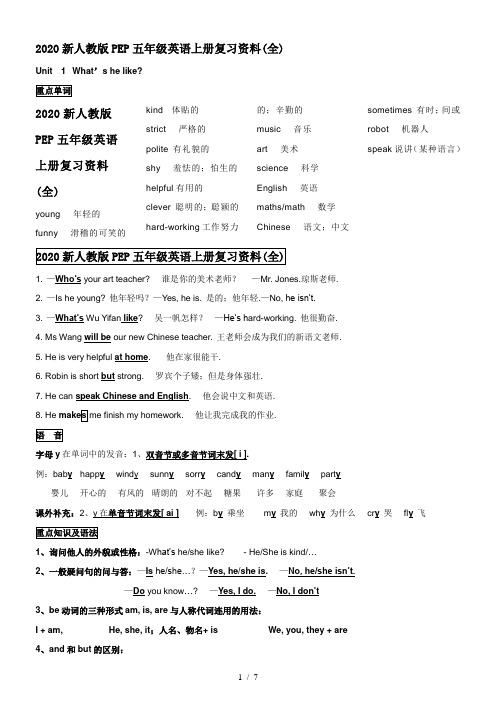
2020新人教版PEP五年级英语上册复习资料(全) Unit 1 What’s he like?2020新人教版PEP五年级英语上册复习资料(全)young 年轻的funny 滑稽的可笑的kind 体贴的strict 严格的polite 有礼貌的shy 羞怯的;怕生的helpful有用的clever 聪明的;聪颖的hard-working工作努力的;辛勤的music 音乐art 美术science 科学English 英语maths/math 数学Chinese 语文;中文sometimes 有时;间或robot 机器人speak说讲(某种语言)1. —Who’s your art teacher? 谁是你的美术老师?—Mr. Jones.琼斯老师.2. —Is he young? 他年轻吗?—Yes, he is. 是的;他年轻.—No, he isn’t.3. —What’s Wu Yifan like? 吴一帆怎样?—He’s h ard-working. 他很勤奋.4. Ms Wang will be our new Chinese teacher. 王老师会成为我们的新语文老师.5. He is very helpful at home. 他在家很能干.6. Robin is short but strong. 罗宾个子矮;但是身体强壮.7. He can speak Chinese and English. 他会说中文和英语.8. He 他让我完成我的作业.字母y在单词中的发音:1、双音节或多音节词末发[ i ].例:bab y happ y windy sunn y sorr y cand y man y famil y part y婴儿开心的有风的晴朗的对不起糖果许多家庭聚会课外补充:2、y在单音节词末发[ ai ] 例:b y 乘坐m y我的wh y 为什么cr y 哭fl y 飞1、询问他人的外貌或性格:-W hat’s he/she like? - He/She is kind/…2、一般疑问句的问与答:—Is he/she…?—Yes, he/she is.—No, he/she isn’t.—Do you know…? —Yes, I do.—No, I don’t3、be动词的三种形式am, is, are与人称代词连用的用法:I + am, He, she, it;人名、物名+ is We, you, they + are4、and和but的区别:and “和;与”;表并列关系 He is . 他又高又瘦.but “但是”;表转折关系 He is . 他个子矮;但是身体强壮.Unit 2 My week2020新人教版PEP 五年级英语上册复习资料(全)Monday (Mon.) 周一Tuesday(Tue./Tues.)周二Wednesday(Wed./Weds.) 周三Thursday (Thur./Thurs.) 周四 Friday (Fri.) 周五 Saturday (Sat.) 周六 weekend 周末 wash my clothes 洗衣服 watch TV 看电视 do homework 做作业 read books 看书 play football 踢足球 on the weekend 在周末 play sports/do sports 做体育运动 listen to music 听音乐 play ping-pong 打乒乓球1. 星期四你们上什么课?—I have math, English and music. 我们上数学、英语和音乐课.2. 爷爷;星期四你要做什么?—I have a cooking class with your grandma. 我和你奶奶去上烹饪课.3. —Do you often read books in this park? 你经常在这个公园看书吗?—Yes, I do. 是的 —No, I don’t. 不是4. Look at my picture. 看我的图片.5. You look tired . 你看 起来很累.6. You should play sports every day. 你应该每天做运动.字母组合ee, ea 在单词中的的发音:[ i: ]例:f ee t b ee f m ee t s ee f ee d t ea r ea d ea t rep ea t脚 牛肉 遇见 看见 喂养 茶 阅读 吃 重复注:1、ee 组合绝大部分发长音[ i: ];只有少部分发短音[ i ];如:coffee 咖啡2、ea 字母组合除了发[ i: ];还有可能发[ e ]等发音;如:bread 面包;或者发[ ei ];如:great 好极了 1、 询问做什么事/活动:—What do you do …? —I often play ping-pong …询问星期几上什么课:—What do you have on …? —We have English class …2、一般疑问句的问与答:—Do you often read books? —Yes, I do . —No, I don’t.3、 ;如:on Monday/Tuesday …课外at+具体时刻(…点钟);如:at 12 o’clock 在十二点整补充:in+大致时间(年月;早中晚);如:in 2014 在2014年in the morning/afternoon/evening 4、play + 球类、棋类、娱乐活动;如:play football/ping-pong补充:play + the + 乐器(第四单元知识);如:play the pipa/piano/violin…Unit 3What would you like?重点单词2020新人教版PEP五年级英语上册复习资料(全)hamburger 汉堡包tea 茶sandwich 三文治salad 沙拉fresh 新鲜的healthy 健康的delicious 美味的;hot 辣的;辛辣的sweet 含糖的;甜的hungry 饿的thirsty 渴的;口渴的favourite 特别喜爱的food 食物drink 喝;饮carrot 胡萝卜chicken 鸡肉onion 洋葱milk 牛奶bread 面包beef noodles 牛肉面fish sandwich 鱼肉三明治tomato soup 西红柿汤2020新人教版PEP五年级英语上册复习资料(全)1.—What would you like to eat? 你想吃什么?—A sandwich, please. 请给我一个三明治.—What would you like to drink? 你想喝什么?—I’d like some water. 我想喝点水.2. —What’s your favourite food?你最喜欢吃什么食物?—Noodles. They are delicious.面条.面条很好吃.3. My/His /Her favourite food is fish. 我/他/她最喜欢的食物是鱼.4. I’m hungry/thirsty. 我饿/渴了.5. I don’t like beef but chicken is OK. 我不喜欢牛肉但是鸡肉也可以.6. Onions are my favourite vegetable. 洋葱是我最喜欢的蔬菜.7. I like vegetables but not carrots. 我喜欢吃蔬菜但不喜欢胡萝卜.语音字母组合ow在单词中的发音:[ au ]例:[ au ] c ow奶牛fl ow er 花w ow哇d ow n 向下h ow如何;怎样n ow现在sl ow慢的sn ow雪yell ow黄色wind ow窗户sn ow y 下雪的tomorr ow明天重点知识及语法1、询问想要吃/喝什么:—What would you like to eat/drink? —I’d like…2、询问最喜欢的事物:—What’s your favourite food/vegetable/…? —My favourite food/…is…/I like…3、名词复数的规则变化:(1)直接加s;(2)以s, x, sh, ch结尾的;加es;如;bus es box es sandwich es(3)以o结尾;有生命的加es;如;potato es tomato es;无生命的加s;如;photo s piano s zoo s柳林小学五年级上册期末复习资料(4)以辅音加y结尾;改y为i再加es;如;famil ies bab ies;以元音加y结尾;直接加s;如;boy s day s (5)以f或fe结尾;改f为v再加es;如knife-kni ves小刀leaf-lea ves树叶4、some+可数/不可数名词例:some apple s(可数)some water/rice/juice/bread/…(不可数)课外补充:不可数名词(词后不可以加-s/es;所接动词用单数is /V-s/es)液体water milk tea orange(桔汁)coke juice 气体air(空气)食物food rice bread fruit 肉类meat(肉)fish beef chi ckenpaper(纸)time music weather(天气)rain snow moneyUnit 4 What can you do?2020新人教版PEP五年级英语上册复习资料(全) sing English songs唱英文歌play the pipa 弹琵琶do kung fu 打功夫draw cartoons 画漫画swim 游泳speak English 说英语cook 烹饪;烹调play basketball 打篮球play ping-pong 打兵乓球draw pictures 画画clean the classroom打扫教室1. We’ll have an English party next Tuesday! 我们下周二将举行英语派对.2. —What can you do for the party? 你能为派对做些什么呢?—I can sing English songs. 我能唱英文歌.3. How/What about you? 你呢?4. Can you do any kung fu? 你会打功夫吗—Yes, I can. 是的;我会. —No, I can’t.5. No problem. I can help you. 没问题.我会帮你.6. I can play ping-pong, but I can’t swim. 我会打乒乓球;但我不会游泳.7. Please send me an email at*****************.请给我发邮件;邮箱*****************.字母组合oo在单词中的发音:[ u ];[ u: ]例:[ u ] l oo k 看g oo d 好的b oo k 书c oo k 烹饪w oo d 木头f oo t 脚助记口诀:1. 看look好good书book;砍柴wood做饭cook洗脚foot.2. 押韵记忆:Look good book, cook wood foot.[ u: ] ball oo n 气球f oo d 食物z oo动物园n oo dles 面条注:字母组合oo发音少数发短音[ u ];多数发长音[ u: ] .1、询问对方会做什么事情:—What can you do? —I can play the pipa.2、can 句型的否定句:I can ’t play the pipa.3、can 句型的一般疑问句的问与答:—Can you do any kung fu? —Yes, I can./No, I can ’t.4、play + the + 乐器;例 play the erhu /pipa /piano …play + 球类、棋类、娱乐活动;例 play basketball/football/ping-pong …5、some 与any 的异同:不同之处:some+可数名词复数/不可数名词(用于肯定句中) 例:I can do some kung fu. 我会打功夫.any+可数名词复数/不可数名词(用于否定句或疑问句中)例:I can ’t do any kung fu. 我不会练武术. Can you do any kung fu?你会练武术吗?Unit 52020新人教版PEP 五年级英语上册复习资料(全) photo 照片;相片 plant 植物 water bottle 水瓶 bike 自行车;脚踏车 in front of 在……前面 beside 在旁边(附近) between 在……中间 behind 在……后面 above 在……上面 so many 许多 their 他们的 lots of 许多 dirty 肮脏的 near 在附近 house 房屋1. Your room is really nice ! 你的房间真漂亮!2. There is a big bed. 有一张床.3. 我的电脑在书桌这里.4. This is my room.这是我的房间.5. There are so many picture 这有许多照片.6. My father can draw very well . 我父亲画的很好.7 .—Where is the ball? 球在哪里? —It ’s in front of the dog. 在狗的前面.8. There is a tree in front of the house. 在房子前有棵树.9. I live near the nature park. 我住在自然公园附近.字母组合ai, ay 在单词中的发音:[ ei ]例:r ai ny 下雨的 r ai nbow 彩虹 p ai nt 涂色 w ai t 等待 s ay 说 w ay 路;方法 birthd ay 生日 Mond ay 周一 d ay 天;日子 tod ay 今天 m ay 可以1、there be (is, are )句型的单复数形式:There is a clock. There are lots of flower(1)There be句型的动词就近原则:例:There isThere are2、询问方位或地点:—Where is the ball? —It’s in front of the dog.3、lots of + 可数/不可数名词= a lot of + 可数/不可数名词“许多……”比较:many + 可数名词复数“许多……”例:There are many treemuch + 不可数名词“许多…....”例:I drink much water every day. 我每天喝很多水.4、动词+very well例:My father can draw very well我爸爸画的很好比较:be (am/is/are)+very good例:The book is very good. 这本书非常好.Unit 62020新人教版PEP五年级英语上册复习资料(全) hill 山丘;小山river 河;江mountain 高山;山岳lake 湖;湖泊village 村庄;村镇house 房屋;房子;住宅tree 树;树木;乔木bridge 桥go boating 去划船nature park 自然公园people 人;人们rabbit 兔子duck 鸭子animal 动物high 高的children 孩子们(child的复数形式)2020新人教版PEP五年级英语上册复习资料(全)2. —Is there a river in the forest? 森林里有河流吗?—Yes, there is.是;有的. —No, there isn’t.3. The nature park is so quiet! 自然公园这么安静!4. There aren’t many people. 没有许多人.5. —Are there自然公园例有高楼吗?—Yes, there are.是;有的. —No, there aren’t.不;没有.6. —How many? 多少? —Two. 两个.7. Robin isat Mr. Jones’ house. 罗宾在琼斯先生的房子里. 字母组合ou在单词中的发音:[ au ]例:h ou se 房屋;房子m ou se 老鼠s ou nd 声音;听起来c ou nt 数数提示:字母组合ow也有些发[ au ];例:c ow奶牛h ow如何;怎样d ow n 向下there be句型的一般疑问句的问与答:—Is there a lake? —Yes, there is. —No, there isn’t.—Are there any animal s? —Yes, there are. —No, there aren’t.2、there be(is, are)句型的单复数形式(具体见Unit 5例:There is a nature park near the house. There are many duck3、some与any在肯定句、否定句及问句中的用法:some+可数名词复数/不可数名词(用于肯定句中)any+可数名词复数/不可数名词(用于否定句或疑问句中)4、people人;人们(集体名词;明为单数;实为复数;词末不能加-s)例:There are many people in the park.。
五年级上英语Unit 4-经典教学教辅文档[1]
![五年级上英语Unit 4-经典教学教辅文档[1]](https://img.taocdn.com/s3/m/d1918551a9114431b90d6c85ec3a87c240288ab8.png)
Unit 4 Shopping DayStory Time教学设计教学内容: Story Time (P54-55)教学目标:1. 能够在教师的引导下,借助图片和其他浏览策略读懂本单元的故事,完成排序和写故事结尾的任务。
2. 能够经过学习小故事,丰富有关购物的言语,在情景中领会词汇和功能句的运用。
3. 能够懂得努力才可能有播种的道理。
教学重点:1. 能够借助图片和其他浏览策略读懂本单元的故事。
2. 能够在教师的指点下朗读故事。
教学难点:能够为故事续写结尾。
教学预备:卡片、多媒体课件等教学工夫:2019年11月22日教学过程:Step 1 Warm-upEnjoy the song.Step 2 Lead-inLook and guess.激发先生浏览兴味教师出示第一幅主题图,让先生关注主人公,发问:Who is the boy? 经过图片上的提示先生知道主人公的名字Peter。
先生再次观察第一幅图,回答教师发问:What does Peterwant/like? 猜一猜。
Step 3 Presentation1. 出示对话,初步感知信息,并验证之前的猜测。
2. 先生自主浏览故事第一段,回答成绩,并在文本中找出相应的句子。
3. 请先生边读边梳理故事线索,检索重要信息。
The dog is 35 dollars. But Peter just has 25 dollars. 教师提出成绩:What should Peter do? 先生讨论。
(Tips:如果英文表达有困难,可以用汉语说,鼓励先生积极发言)4. 先生浏览第四幅图文本,印证本人的预测,并和教师一同挑选信息:Two dollars for an ice-cream. Five dollars for washing the car. 2 and 5 and 25. Now he has 32 dollars.教师发问:Now, can he buy the puppy? 再次激发先生对故事的兴味。
新版PEP五年级英语期末复习上册Unit4--Unit6 重点知识整理

新版PEP小学英语五年级上册期末复习Unit4—Unit6重点知识整理重点词组英语派对English party 下周二next Tuesday弹琵琶play the pipa 打乒乓球play the ping-pang 上英语课have an English classs 唱英语歌sing English songs练武术do some kungfu 画画draw pictures画卡通draw cartoons 打扫教室clean the classroom 说英语speak English 说汉语speak Chinese唱生日歌sing the birthday song 学习武术lean some kungfu 没问题no problem 打篮球play basketball踢足球play football 一个新朋友 a new friend等一下wait a minute 弹钢琴play the piano许多图片so many pictures 一张漂亮的照片 a nice photo我奶奶家的花园my grandma’s garden 许多美丽的花many pretty flowers 在房间里in the room 在床边beside the bed一张大床a big bed 我的电脑my computer在桌子上on the table 一些图片some pictures一些花朵some flowers 一些玩具some toys客厅living room 在…前面in front of许多a lot of = lots of 美术老师art teacher一座老房子an old house 在地板上on the floor在自然公园附近near the nature park 看一看have a look在天空中in the sky 一只大色的大鸟 a big white bird 在河里in the river 在公园里in the park去森林go to the forest 一些小船some small boat在山前面in front of the mountain 去划船go boating高楼tall buildings 在山上on the mountain高山high mountain 小村庄 a small village去自然公园go to the nature park 拍照take some pictures在那边over there重点句型1. We’ll have an English party next Tuesday.我们将要有一个英语派对。
PEP小学英语五年级上册复习要点(4-6)

What can you do?1.What can you do? 你会做什么?I can sweep the floor. 我会扫地。
做家务(do housework):sweep the floor cook the meals clean the bedroom water the flowers empty the trash do the dishesmake the bed wash the clothes set the tableput away the clothes use a computer2.Can you …? 你会……吗?Yes, I can.No, I can’t.3.其他:Are you helpful at home? 你在家有用吗?(经常帮忙)Sure. 当然了。
You’re helpful. 你真能干。
My new room1.There are …那儿有…There is a …There are two bedrooms, a kitchen, a bathroom and a living room. There is a mirror, a bed and a big closet.家具:curtain mirror end table closet trash bin air-conditioner 房间:bedroom kitchen bathroom living room study2.The closet is near the table.Many clothes are in the closet.The trash bin is behind the door.方位介词:in on under near over behind in front of3.Where is the …? …….在哪儿?It’s near the table. 它在桌子边上。
新人教版PEP五年级英语上册复习资料(全)培训讲学

新人教版P E P五年级英语上册复习资料(全)新版PEP五年级上册知识点总结Unit 1 What’s he like?old 老的,年纪大的young 年轻的funny 滑稽的可笑的kind 体贴的strict 严格的polite 有礼貌的shy 羞怯的,怕生的helpful有用的clever 聪明的,聪颖的hard-working工作努力的,辛勤的music 音乐art 美术science 科学English 英语maths/math 数学Chinese 语文,中文sometimes 有时,间或robot 机器人speak说讲(某种语言)1. —Who’s your art teacher? 谁是你的美术老师?—Mr. Jones.琼斯老师。
2. —Is he young? 他年轻吗?—Yes, he is. 是的,他年轻。
—No, he isn’t.3. —What’s Wu Yifan like? 吴一帆怎样?—He’s hard-working. 他很勤奋。
4. Ms Wang will be our new Chinese teacher. 王老师会成为我们的新语文老师。
5. He is very helpful at home. 他在家很能干。
6. Robin is short but strong. 罗宾个子矮,但是身体强壮。
7. He can speak Chinese and English. 他会说中文和英语。
8. He他让我完成我的作业。
字母y在单词中的发音:1、双音节或多音节词末发[ i ]。
例:bab y happ y windy sunn y sorr y cand y man y famil y part y 婴儿开心的有风的晴朗的对不起糖果许多家庭聚会课外补充:2、y 在单音节词末发[ ai ] 例:b y 乘坐 m y 我的 wh y 为什么 cr y 哭 fl y 飞1、询问他人的外貌或性格:-What’s he/she like? - He/She is kind/…2、一般疑问句的问与答:—Is he/she…?—Yes, he/she is. —No, he/she isn’t. —Do you know …? —Yes, I do. —No, I don ’t3、be 动词的三种形式am, is, are 与人称代词连用的用法:I + am, He, she, it ,人名、物名+ is We, you, they + are 4、and 和but 的区别:and “和,与”,表并列关系 He is . 他又高又瘦。
五年级上册英语重要辅导资料(4-6单元)人教版
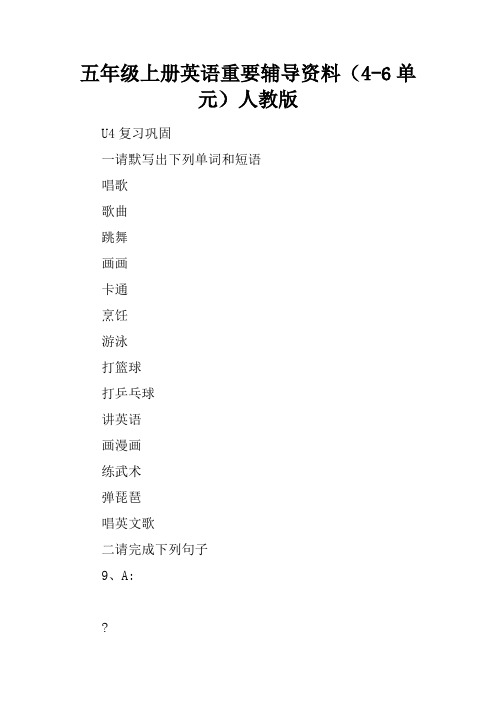
五年级上册英语重要辅导资料(4-6单元)人教版U4复习巩固一请默写出下列单词和短语唱歌歌曲跳舞画画卡通烹饪游泳打篮球打乒乓球讲英语画漫画练武术弹琵琶唱英文歌二请完成下列句子9、A:?B:es,IandseungfuA:?B:Ianseeptheflr三语法重点、当你想询问别人会干什么时,用hatanud?/当你想知道他人会干什么时,可用hatanhed?或者hatanshed?2、Ian…变为一般疑问句:anu…?肯定回答是否定回答是U复习巩固一请默写出下列单词和短语时钟植物瓶子自行车照片正面两者之间在上面在前面在旁边在后面二请完成下列句子0、A:?B:ThereisabigbedintherA:B:es,1、A:thetrashbin?B:It'sthetable三语法重点Therebe句型:它一般表示在某地有某物。
Therebe句型包括单数形式的Thereisa/an…句型和复数形式的thereare…句型。
Thereisa/an…句型表示有一个,后面跟名词单数。
如Thereisairrrntheall。
Thereare…句型表示有多个,后面一般接具体数字或se,an,再后面跟名词复数,如Therearetendtablesnearthebed。
2、Therebe句型中使用单数句式还是复数句式遵循就近原则。
有一个讲台和许多桌在教室里。
Thereateaher’sdesandandessinther有许多桌和一个讲台在教室里。
Thereandessandateaher’sdesinther3、Therebe句型变为一般疑问句时,将助动词be提前,与there交换位置,如句中有第一人称代词,变为第二人称,se或an改为an将句末的句号变为问号,其他不变。
写一写:ThereisalsetnearthebedThereisariverinvillageU6复习巩固一请默写出下列单词和短语森林江河湖泊高山小山树建筑物桥村庄房屋二请完成下列句子2、A:?B:es,thereisA:Isthereafar?B:3、A:?B:es,thereareA:Arethereinurvillage?B:N,therearen't三语法重点表示“在树上”时,in与n的不同用法:当表示人或其他动物在树上时,用in /当表示树本身的东西如树叶、果实在树上时,用n。
人教版PEP五年级英语上册复习资料(全)资料讲解

人教版P E P五年级英语上册复习资料(全)PEP五年级上册知识点总结Unit 1 What’s he like?old 老的,年纪大的young 年轻的funny 滑稽的可笑的kind 体贴的strict 严格的polite 有礼貌的shy 羞怯的,怕生的helpful有用的clever 聪明的,聪颖的hard-working工作努力的,辛勤的music 音乐art 美术science 科学English 英语maths/math 数学Chinese 语文,中文sometimes 有时,间或robot 机器人speak说讲(某种语言)1. —Who’s your art teacher? 谁是你的美术老师?—Mr. Jones.琼斯老师。
2. —Is he young? 他年轻吗?—Yes, he is. 是的,他年轻。
—No, he isn’t.3. —What’s Wu Yifan like? 吴一帆怎样?—He’s hard-working. 他很勤奋。
4. Ms Wang will be our new Chinese teacher. 王老师会成为我们的新语文老师。
5. He is very helpful at home. 他在家很能干。
6. Robin is short but strong. 罗宾个子矮,但是身体强壮。
7. He can speak Chinese and English. 他会说中文和英语。
8. He他让我完成我的作业。
字母y在单词中的发音:1、双音节或多音节词末发[ i ]。
例:bab y happ y windy sunn y sorr y cand y man y famil y part y婴儿 开心的 有风的 晴朗的 对不起 糖果 许多 家庭 聚会课外补充:2、y 在单音节词末发[ ai ] 例:b y 乘坐 m y 我的 wh y 为什么 cr y 哭 fl y 飞1、询问他人的外貌或性格:-What’s he/she like? - He/She is kind/…2、一般疑问句的问与答:—Is he/she…?—Yes, he/she is. —No, he/she isn’t. —Do you know …? —Yes, I do. —No, I don ’t3、be 动词的三种形式am, is, are 与人称代词连用的用法:I + am, He, she, it ,人名、物名+ is We, you, they + are 4、and 和but 的区别:and “和,与”,表并列关系 He is . 他又高又瘦。
最新完整人教版五年级英语上册第四单元知识点归纳总结及作文范文
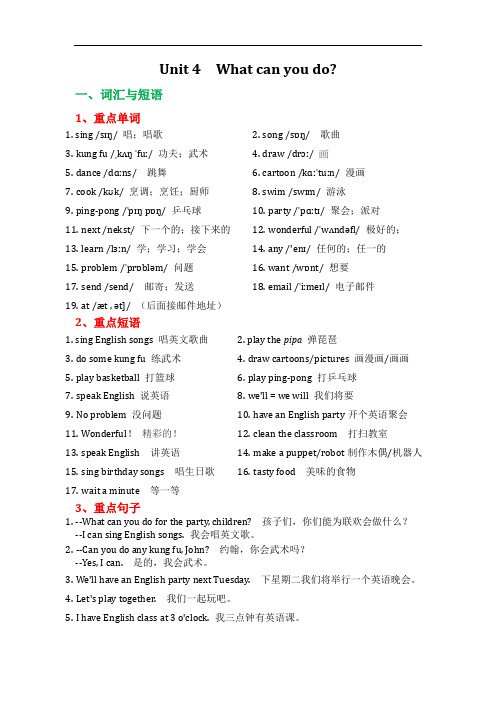
Unit 4 What can you do?一、词汇与短语1、重点单词1. sing /sɪŋ/ 唱;唱歌2.song /sɒŋ/ 歌曲3.kung fu /ˌkʌŋ ˈfuː/ 功夫;武术4.draw /drɔː/ 画5.dance /dɑːns/ 跳舞6.cartoon /kɑːˈtuːn/ 漫画7.cook /kʊk/ 烹调;烹饪;厨师8.swim /swɪm/ 游泳9.ping-pong /ˈpɪŋ pɒŋ/ 乒乓球10.party /ˈpɑːtɪ/ 聚会;派对11.next /nekst/ 下一个的;接下来的12.wonderful /ˈwʌndəfl/ 极好的;13.learn /lɜːn/ 学;学习;学会14.any /'enɪ/ 任何的;任一的15.problem /ˈprɒbləm/ 问题16.want /wɒnt/ 想要17.send /send/ 邮寄;发送18.email /ˈiːmeɪl/ 电子邮件19.at /æt , ət]/ (后面接邮件地址)2、重点短语1. sing English songs 唱英文歌曲2. play the pipa弹琵琶3.do some kung fu 练武术4.draw cartoons/pictures 画漫画/画画5.play basketball 打篮球6.play ping-pong 打乒乓球7.speak English 说英语8.we'll = we will 我们将要9.No problem 没问题10.have an English party开个英语聚会11.Wonderful!精彩的!12.clean the classroom 打扫教室13.speak English 讲英语14.make a puppet/robot制作木偶/机器人15.sing birthday songs 唱生日歌16.tasty food 美味的食物17.wait a minute 等一等3、重点句子1. --What can you do for the party, children? 孩子们,你们能为联欢会做什么?--I can sing English songs. 我会唱英文歌。
五年级上册英语4至6单元知识写出一篇作文
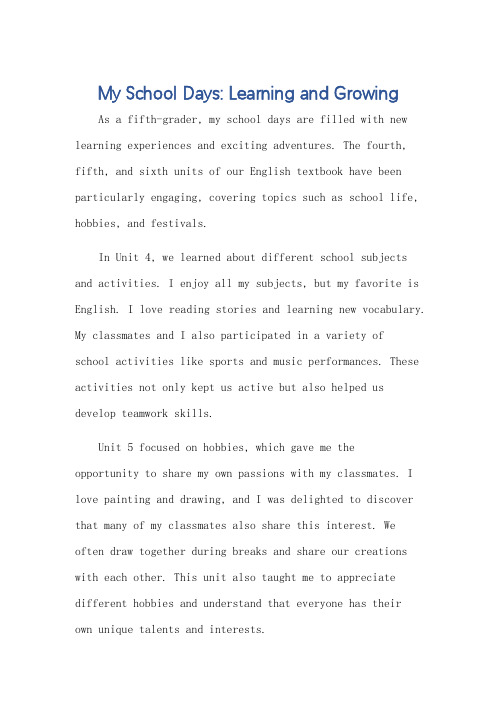
My School Days: Learning and GrowingAs a fifth-grader, my school days are filled with new learning experiences and exciting adventures. The fourth, fifth, and sixth units of our English textbook have been particularly engaging, covering topics such as school life, hobbies, and festivals.In Unit 4, we learned about different school subjects and activities. I enjoy all my subjects, but my favorite is English. I love reading stories and learning new vocabulary. My classmates and I also participated in a variety ofschool activities like sports and music performances. These activities not only kept us active but also helped us develop teamwork skills.Unit 5 focused on hobbies, which gave me theopportunity to share my own passions with my classmates. I love painting and drawing, and I was delighted to discover that many of my classmates also share this interest. Weoften draw together during breaks and share our creations with each other. This unit also taught me to appreciate different hobbies and understand that everyone has their own unique talents and interests.The sixth unit introduced us to different festivals and celebrations from around the world. I was fascinated by the diversity of cultures and traditions represented in these festivals. Learning about these celebrations helped me understand the importance of unity and inclusivity in our school community. We celebrated these festivals together, sharing food, dances, and stories from our respective cultures.Through these units, I have learned not only about new concepts and vocabulary but also about the importance of cooperation, respect, and inclusivity. My school days are not just about academic learning; they are also about personal growth and developing a sense of belonging. I am grateful for the opportunities my school provides and look forward to the many more learning experiences that lie ahead.**我的学校生活:学习与成长**作为一名五年级学生,我的学校生活充满了新的学习经历和令人兴奋的冒险。
最新完整人教版五年级上册英语总复习各单元知识点总结归纳及作文范文汇总

目录Unit 1 What's he like? (1)一、词汇与短语 (1)1、重点单词 (1)2、重点短语 (1)3、重点句子 (1)二、语法知识点 (2)三、作文范文 (5)1、范文一 (5)2、范文二 (6)3、范文三 (6)Unit 2 My week (8)一、词汇与短语 (8)1、重点单词 (8)2、重点短语 (8)3、重点句子 (8)二、语法知识点 (9)三、作文范文 (15)1、范文一 (15)2、范文二 (16)3、范文三 (16)Unit 3 What would you like? (17)一、词汇与短语 (17)1、重点单词 (17)2、重点短语 (17)3、重点句子 (17)二、语法知识点 (18)4、名词的数 (19)三、作文范文 (25)1、范文一 (25)2、范文二 (25)3、范文三 (25)4、范文四 (26)Unit 4 What can you do? (27)一、词汇与短语 (27)1、重点单词 (27)2、重点短语 (27)3、重点句子 (27)二、语法知识点 (28)三、作文范文 (30)1、范文一 (30)2、范文二 (30)3、范文三 (31)4、范文四 (31)Unit 5 There is a big bed (32)一、词汇与短语 (32)1、重点单词 (32)2、重点短语 (32)3、重点句子 (32)二、语法知识点 (33)三、作文范文 (38)1、范文一 (38)2、范文二 (38)3、范文三 (38)Unit 6 In a nature park (40)一、词汇与短语 (40)1、重点单词 (40)2、重点短语 (40)3、重点句子 (40)二、语法知识点 (41)三、作文范文 (42)1、范文一 (42)2、范文二 (43)3、范文三 (43)作文训练 (44)作文训练答案 (46)Unit 1 What's he like?一、词汇与短语1、重点单词1.old /əʊld/ 老的;年纪大的2.young /jʌŋ/ 年轻的;岁数不大的3.funny /'fʌnɪ/ 滑稽的;可笑的4.kind /kaɪnd/ 体贴的;慈祥的;宽容的5.strict /strɪkt/ 要求严格的;严厉的6.polite /pə'laɪt/ 有礼貌的;客气的7.hard-working /ˌhɑːd ˈwɜːkɪŋ/8.helpful /'helpfl/ 有用的;愿您帮忙的工作努力的;辛勤的9.clever /ˈklevə(r)/ 聪明的;聪颖的10.shy /ʃaɪ/ 胆怯的;腼腆的;怕生的11.know /nəʊ/ 知道;了解12.our /ˈaʊə(r) , ɑː(r)/ 我们的13.Ms /mɪz/ 女士(不指明婚否)14.will /wɪl/ (谈及将来)将要15.sometimes /ˈsʌmtaɪmz/ 有时16.robot /ˈrəʊbɒt/ 机器人17.him /hɪm/ (用作宾语或表语)他18.finish /ˈfɪnɪʃ/ 完成;做好19.speak /spi:k/会说;会讲(某种语言);用(某种语言)说话2、重点短语1.music teacher 音乐老师2.art teacher 美术老师3.science teacher 科学老师4.English teacher 英语老师5.maths teacher 数学老师6.new Chinese teacher 新的语文老师7.a good football player 好的足球运动员8.funny teacher 滑稽搞笑的老师9.head teacher 校长10.speak Chinese 讲汉语11.speak Chinese 讲英语12.at home 在家13.finish my homework 完成作业14.tall and strong 又高又强壮15.play football 踢足球3、重点句子1. --Is he young? 他年轻吗?--No, he isn't. 不,他不年轻。
XX年五年级上册英语单元重要知识点整理(4-6单元)
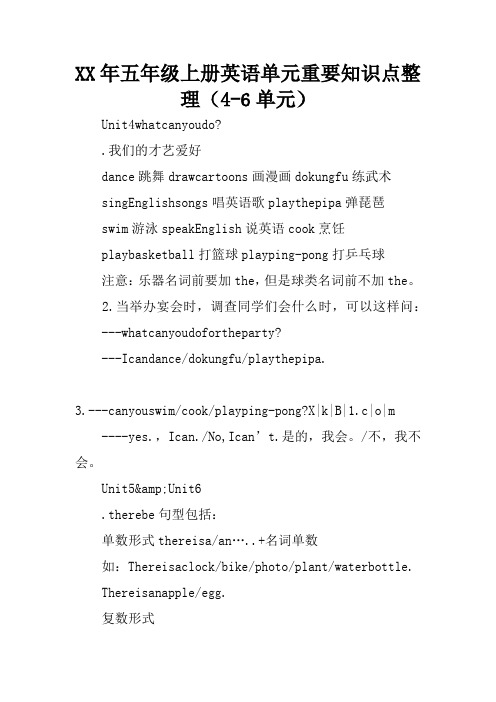
XX年五年级上册英语单元重要知识点整理(4-6单元)Unit4whatcanyoudo?.我们的才艺爱好dance跳舞drawcartoons画漫画dokungfu练武术singEnglishsongs唱英语歌playthepipa弹琵琶swim游泳speakEnglish说英语cook烹饪playbasketball打篮球playping-pong打乒乓球注意:乐器名词前要加the,但是球类名词前不加the。
2.当举办宴会时,调查同学们会什么时,可以这样问:---whatcanyoudofortheparty?---Icandance/dokungfu/playthepipa.3.---canyouswim/cook/playping-pong?X|k|B|1.c|o|m----yes.,Ican./No,Ican’t.是的,我会。
/不,我不会。
Unit5&Unit6.therebe句型包括:单数形式thereisa/an…..+名词单数如:Thereisaclock/bike/photo/plant/waterbottle.Thereisanapple/egg.复数形式Thereare+具体数字/many/some+名词复数如:Therearetwobikes.这里有两辆自行车。
Therearesomebuildings.这里有一些建筑。
Therearemanytrees.这里有许多树。
2.当询问他人这里有什么吗时,只需要把Thereis…变成Isthere…?Thereare…变成Arethere...?如:Thereisariver/hill/forest/lake/mountain.Isthereariver/hill/forest/lake/mountain?肯定回答:yes,thereis.否定回答:No,thereisn’t.Therearefourbridges/villages.Aretherefourbridges/villages?肯定回答:yes,thereare.否定回答:No,therearen’t.3.当问球在哪里时,应该问:---whereistheball?---It’sinbeside/behind/above/infrontofthedog.Unit5&Unit6.therebe句型包括:单数形式thereisa/an…..+名词单数如:Thereisaclock/bike/photo/plant/waterbottle.Thereisanapple/egg.复数形式Thereare+具体数字/many/some+名词复数如:Therearetwobikes.这里有两辆自行车。
新人教版PEP五年级英语上册各单元知识点复习总结
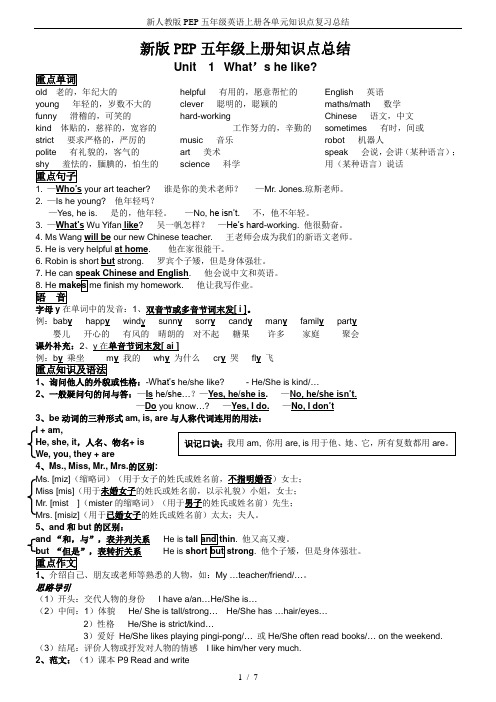
新人教版PEP五年级英语上册各单元知识点复习总结新版PEP五年级上册知识点总结Unit 1 What’s he like?重点单词old 老的,年纪大的young 年轻的,岁数不大的funny 滑稽的,可笑的kind 体贴的,慈祥的,宽容的strict 要求严格的,严厉的polite 有礼貌的,客气的shy 羞怯的,腼腆的,怕生的helpful 有用的,愿意帮忙的clever 聪明的,聪颖的hard-working工作努力的,辛勤的music 音乐art 美术science 科学English 英语maths/math 数学Chinese 语文,中文sometimes 有时,间或robot 机器人speak 会说,会讲(某种语言);用(某种语言)说话重点句子1. —Who’s your art teacher? 谁是你的美术老师?—Mr. Jones.琼斯老师。
2. —Is he young? 他年轻吗?—Yes, he is. 是的,他年轻。
—No, he isn’t.不,他不年轻。
3. —What’s Wu Yifan like? 吴一帆怎样?—He’s hard-working. 他很勤奋。
4. Ms Wang will be our new Chinese teacher. 王老师会成为我们的新语文老师。
5. He is very helpful at home. 他在家很能干。
6. Robin is short but strong. 罗宾个子矮,但是身体强壮。
7. He can speak Chinese and English. 他会说中文和英语。
8. He makes me finish my homework. 他让我写作业。
语音字母y在单词中的发音:1、双音节或多音节词末发[ i ]。
例:bab y happ y windy sunn y sorr y cand y man y famil y part y婴儿开心的有风的晴朗的对不起糖果许多家庭聚会课外补充:2、y在单音节词末发[ ai ]例:b y 乘坐m y 我的wh y 为什么cr y 哭fl y 飞重点知识及语法1、询问他人的外貌或性格:-What’s he/she like? - He/She is kind/…2、一般疑问句的问与答:—Is he/she…?—Yes, he/she is.—No, he/she isn’t.—Do you know…? —Yes, I do.—No, I don’t3、be动词的三种形式am, is, are与人称代词连用的用法:I + am,He, she, it,人名、物名+ isWe, you, they + are4、Ms., Miss, Mr., Mrs.的区别:Ms. [miz](缩略词)(用于女子的姓氏或姓名前,不指明婚否)女士;Miss [mis](用于未婚女子的姓氏或姓名前,以示礼貌)小姐,女士;Mr. [mist](mister的缩略词)(用于男子的姓氏或姓名前)先生;Mrs. [misiz](用于已婚女子的姓氏或姓名前)太太;夫人。
五年级上册英语重要辅导资料(4-6单元)人教版【DOC范文整理】
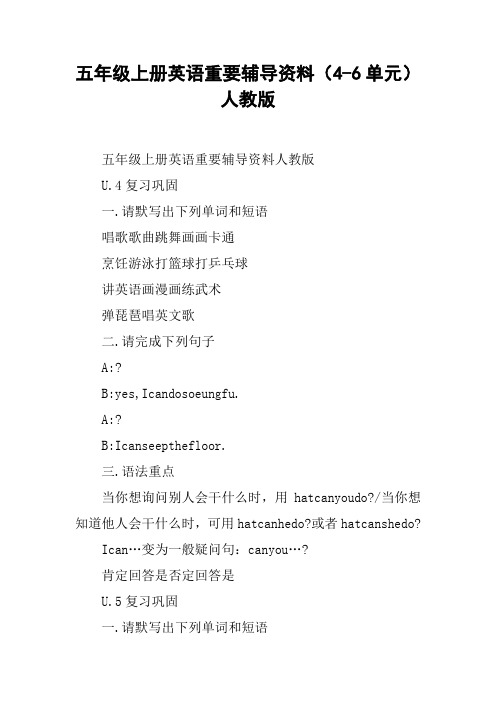
五年级上册英语重要辅导资料(4-6单元)人教版五年级上册英语重要辅导资料人教版U.4复习巩固一.请默写出下列单词和短语唱歌歌曲跳舞画画卡通烹饪游泳打篮球打乒乓球讲英语画漫画练武术弹琵琶唱英文歌二.请完成下列句子A:?B:yes,Icandosoeungfu.A:?B:Icanseepthefloor.三.语法重点当你想询问别人会干什么时,用hatcanyoudo?/当你想知道他人会干什么时,可用hatcanhedo?或者hatcanshedo?Ican…变为一般疑问句:canyou…?肯定回答是否定回答是U.5复习巩固一.请默写出下列单词和短语时钟植物瓶子自行车照片正面两者之间在...上面在...前面在旁边在后面二.请完成下列句子0、A:?B:Thereisabigbedintheroo.A:B:yes,.1、A:thetrashbin?B:It'sthetable.三.语法重点Therebe句型:它一般表示在某地有某物。
Therebe句型包括单数形式的Thereisa/an…句型和复数形式的thereare…句型。
Thereisa/an…句型表示有一个,后面跟名词单数。
如Thereisairrorontheall。
Thereare…句型表示有多个,后面一般接具体数字或soe,any,再后面跟名词复数,如Therearetoendtablesnearthebed。
Therebe句型中使用单数句式还是复数句式遵循就近原则。
有一个讲台和许多课桌在教室里。
Thereateacher’sdesandanydessintheroo.有许多课桌和一个讲台在教室里。
Thereanydessandateacher’sdesintheroo.Therebe句型变为一般疑问句时,将助动词be提前,与there交换位置,如句中有人称代词,变为第二人称,soe 或any改为any将句末的句号变为问号,其他不变。
知识点总结(Unit4-6)(知识清单)人教精通版英语五年级上册
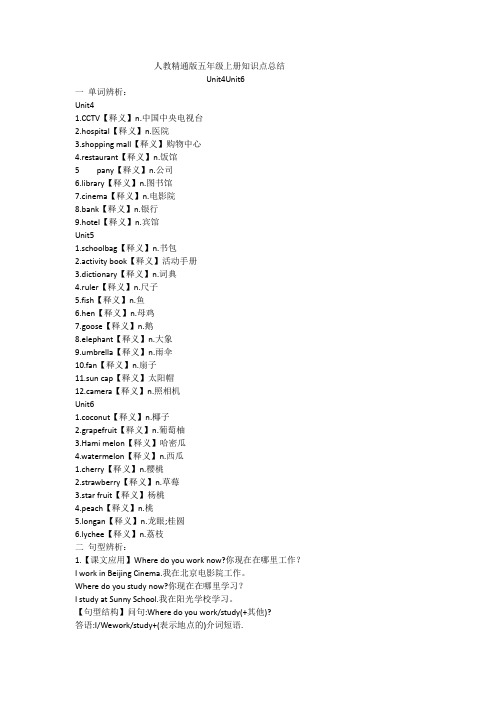
人教精通版五年级上册知识点总结Unit4Unit6一单词辨析:Unit4TV【释义】n.中国中央电视台2.hospital【释义】n.医院3.shopping mall【释义】购物中心4.restaurant【释义】n.饭馆5 pany【释义】n.公司6.library【释义】n.图书馆7.cinema【释义】n.电影院8.bank【释义】n.银行9.hotel【释义】n.宾馆Unit51.schoolbag【释义】n.书包2.activity book【释义】活动手册3.dictionary【释义】n.词典4.ruler【释义】n.尺子5.fish【释义】n.鱼6.hen【释义】n.母鸡7.goose【释义】n.鹅8.elephant【释义】n.大象9.umbrella【释义】n.雨伞10.fan【释义】n.扇子11.sun cap【释义】太阳帽12.camera【释义】n.照相机Unit61.coconut【释义】n.椰子2.grapefruit【释义】n.葡萄柚3.Hami melon【释义】哈密瓜4.watermelon【释义】n.西瓜1.cherry【释义】n.樱桃2.strawberry【释义】n.草莓3.star fruit【释义】杨桃4.peach【释义】n.桃5.longan【释义】n.龙眼;桂圆6.lychee【释义】n.荔枝二句型辨析:1.【课文应用】Where do you work now?你现在在哪里工作?I work in Beijing Cinema.我在北京电影院工作。
Where do you study now?你现在在哪里学习?I study at Sunny School.我在阳光学校学习。
【句型结构】问句:Where do you work/study(+其他)?答语:I/Wework/study+(表示地点的)介词短语.【重点解析】where意为“哪里”,用来对地点进行提问。
人教版PEP五年级英语上册复习资料(全)
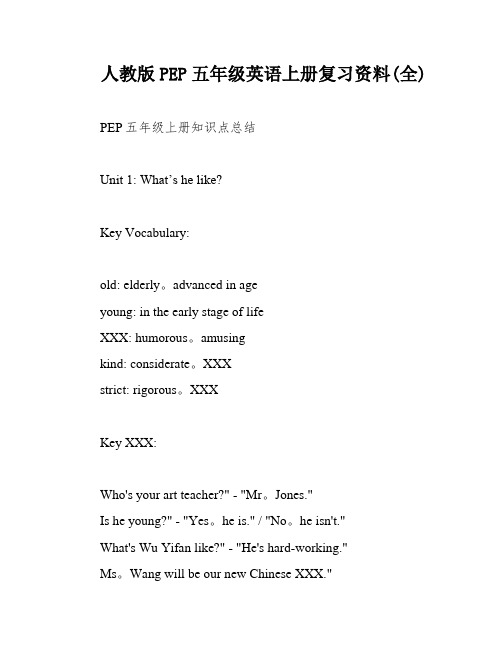
人教版PEP五年级英语上册复习资料(全) PEP五年级上册知识点总结Unit 1: What’s he like?Key Vocabulary:old: elderly。
advanced in ageyoung: in the early stage of lifeXXX: humorous。
amusingkind: considerate。
XXXstrict: rigorous。
XXXKey XXX:Who's your art teacher?" - "Mr。
Jones."Is he young?" - "Yes。
he is." / "No。
he isn't."What's Wu Yifan like?" - "He's hard-working."Ms。
Wang will be our new Chinese XXX."He is very helpful at home."Robin is short but strong."He can speak Chinese and English."XXX"n:XXX "y" is pronounced as [i] at the end of polysyllabic words。
such as "happy" and "many."XXX。
"y" is pronounced as [ai]。
as in "my" and "fly."XXX and Grammar:1.Asking XXX: "What's he/she like?" - "He/She is kind/。
人教版小学五年级上unit4-6复习

课次教学计划(教案)一、教学温故:Unit 4:做饭浇花扫地打扫卧室铺床摆饭桌洗碗碟收拾衣服使用计算机倒垃圾有用的;有帮助的有病的就这么干吧做家务试一试下棋Unit 5:空调垃圾箱壁橱镜子床头柜卧室厨房卫生间客厅在…里面在…上面在…下面在..旁边在…后边衣服公寓看一看告诉;说工作Unit 6:河流花草湖泊森林路公园照片房子桥树公路建筑物干净的天空云山,山脉自然公园农场假期乡村城市空气任何的,所有的二、复习导航:Unit 4 What can you do?知识点归纳一.本单元的重点是动词短语及情态动词can的用法。
sweep the floor 扫地cook the meals 做饭clean the bedroom 打扫卧室water the flowers 浇花empty the trash 倒垃圾wash the clothes 洗衣服set the table 摆饭桌;摆餐具make the bed 铺床do the dishes 洗碗碟put away the clothes 收拾衣服use a computer 使用计算机do housework 做家务at home 在家ill有病的wash the windows擦窗just do it就这么干吧have a try试一试robot 机器人play chess 下棋helpful有用的有帮助的二.能够灵活运用的有关句型。
1. -------What can you/he/I do ?你/他/我能做什么?------ I /He/You can ….我/他/你能….2 . ----- Can you/I/ he …?你/我/他能…吗?----- Yes, I/you/he can. / No(sorry), I can’t .是的,我/你/他能。
/ 不,我不能。
But I ‘d like to have a try.但是我想试一下。
- 1、下载文档前请自行甄别文档内容的完整性,平台不提供额外的编辑、内容补充、找答案等附加服务。
- 2、"仅部分预览"的文档,不可在线预览部分如存在完整性等问题,可反馈申请退款(可完整预览的文档不适用该条件!)。
- 3、如文档侵犯您的权益,请联系客服反馈,我们会尽快为您处理(人工客服工作时间:9:00-18:30)。
五年级上册英语重要辅导资料(4-6单
元)人教版
U.4复习巩固
一.请默写出下列单词和短语
唱歌
歌曲
跳舞
画画
卡通
烹饪
游泳
打篮球
打乒乓球
讲英语
画漫画
练武术
弹琵琶
唱英文歌
二.请完成下列句子
9、A:
?
B:yes,Icandosomekungfu.
A:
?
B:Icansweepthefloor.
三.语法重点
、当你想询问别人会干什么时,用whatcanyoudo?/当你想知道他人会干什么时,可用whatcanhedo?或者whatcanshedo?
2、Ican…变为一般疑问句:canyou…?
肯定回答是
否定回答是
U.5复习巩固
一.请默写出下列单词和短语
时钟
植物
瓶子
自行车
照片
正面
两者之间
在...上面
在...前面
在旁边
在后面
二.请完成下列句子
0、A:
?
B:Thereisabigbedintheroom.
A:
B:yes,
.
1、A:
thetrashbin?
B:It's
thetable.
三.语法重点
Therebe句型:它一般表示在某地有某物。
Therebe句型包括单数形式的Thereisa/an…句型和复数形式的thereare…句型。
Thereisa/an…句型表示有一个,后面跟名词单数。
如Thereisamirroronthewall。
Thereare…句型表示有多个,后面一般接具体数字或some,many,再后面跟名词复数,如Therearetwoendtablesnearthebed。
2、Therebe句型中使用单数句式还是复数句式遵循就近原则。
有一个讲台和许多课桌在教室里。
There
ateacher’sdeskandmanydesksintheroom.
有许多课桌和一个讲台在教室里。
There
manydesksandateacher’sdeskintheroom.
3、Therebe句型变为一般疑问句时,将助动词be提前,与there交换位置,如句中有第一人称代词,变为第二人称,some或many改为any将句末的句号变为问号,其他不变。
写一写:Thereisaclosetnearthebed.
Thereisariverinmyvillage.
U.6复习巩固
一.请默写出下列单词和短语
森林
江河
湖泊
高山
小山
树
建筑物
桥
村庄
房屋
二.请完成下列句子
2、A:
?
B:yes,thereis.
A:Isthereafarm?
B:
3、A:
?
B:yes,thereare.
A:Arethere
inyourvillage?
B:No,therearen't.
三.语法重点
.表示“在树上”时,in与on的不同用法:
当表示人或其他动物在树上时,用in. /当表示树本身的东西如树叶、果实在树上时,用on。
如:Thebirdisinthebigtreeandtheappleisonthesmalltree.
2.一些特殊疑问词的意义与用法:
what什么,用来问是什么,叫什么,干什么,什么样等。
如:whatisthis?这是什么?
where哪里,用来问在什么地方。
如whereareyoufrom?你来自哪里?
who谁,用来询问人物是谁?如:who’sthatman?那个男人是谁?
whose谁的,用来询问东西是谁的。
如:whosebookisthis? 这是谁的书?
whattime什么时间。
用来询问具体时间是几点。
如:whattimeisitnow?现在几点了?
whatcolour什么颜色。
用来问物体是什么颜色的。
如:whatcolourisyourbag?你的书包是什么颜色的?
when什么时候。
用来问时间,后面常跟动词或动词短语。
如:whendoyougetup?你什么时候起床?
How 怎么样。
用来问人的身体状况。
如:Howareyou?你好吗?/Howisyourmother?你妈妈好吗?
Howmany多少。
用来问可数名词的数量。
如:Howmanybooksdoyouhave?你有多少本书?
Howmuch 多少钱。
用来询问商品或物体的价格。
如:Howmuchisyourschoolbag?你的书包多少钱?
Howmuch还可以问不可数名词的数量。
Howmuchporkdoyouwant?你想要多少牛肉?
which哪一个。
用来询问具体的哪一个。
如:whichclassdoyoulikebest?你最喜欢哪一门课程?
8、以系动词be和情态动词can,助动词do等开头的一般疑问句,在答语中首先要用yes或no做出正误判断,后面必须出现问句开头的系动词、情态动词或助动词,使其遵循“问答一致”的原则。
当问句中出现第一人称代词时,还要变为第二人称。
写一写:Areyouastudent?
yes,
.
Isyoursisterateacher?
yes,
.
AmIateacher?
yes,
.
Doyouhavenewteachers?yes,wedo.
DoesAmyhavenewteachers?
yes,
.
canyouwashtheclothes? yes,I
.
canyourbrothersetthetable?yes, can. canyourfriendmakethebed?yes,she .
【Homework】家庭作业
背诵各单元单词及句型。
